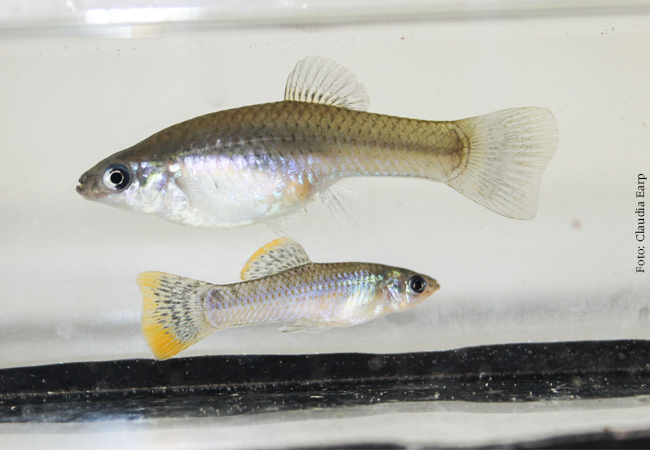
Pet owners have been sure of this for long time, and scientific research provides confirmation: animals, too, have personalities. A study originating at Goethe University documents that even with regard to fish, their own personality traits and that of their potential partner is critical when selecting a “groom”.
Individual animals, from vertebrates to crabs and spiders, exhibit consistent behaviour tendencies that distinguish them from other members of their species. The most thoroughly researched personality trait in the animal world is propensity for risk-taking. A wide range of individuals, from very shy to quite courageous, can be found among the small freshwater fish Poecilia mexicana, which live primarily in the rivers of Mexico. Both traits can be of advantage: while shy fish have a lower risk of being eaten by predatory fish and birds, bold ones are often more efficient at finding food.
Risk-taking males also have advantages when it comes to choosing a partner, as shown in a study by Dr. Carolin Sommer-Trembo and other scientists at Goethe University. Using behaviour tests, males and females were first classified on a scale from shy to bold. A partner selection test followed, in which females were allowed to choose between two males with different risk-taking propensities. To prevent the females from being too strongly affected by other criteria, the males were selected so that they were almost identical in their external characteristics such as body shape, colouration and size.
The results seemed clear: bold males were preferred. But at second glance, the risk appetite of the females also played a role in the decision. Bold females exhibited the strongest preference for bold males, while this preference was weaker among shy females. Are courageous males more attractive to all females, or do less courageous males also have chance, since “birds of a feather flock together”? The study shows that these two mechanisms are intertwined and, as is so often the case, the truth is not a case of “either/or” but of “both/as well as”.
Publication: Sommer-Trembo C, Schreier M, Plath M (2020) Different preference functions act in unison: mate choice and risk-taking behaviour in the Atlantic molly (Poecilia mexicana). Journal of Ethology, DOI: 10.1007/s10164-020-00643-5








